#jen manion
Text

32nd Book I Read in 2024
Title: Female Husbands
Author: Jen Manion
Notes: Bought this at Gay's The Word in London during a weekend trip last spring, but didn't get around to reading it until now. Such a great book though! Never knew about this part of trans history before and I am so happy I finally read it.
#Female Husbands#Jen Manion#trans#transgender#lgbtq#nonfiction#queer#queer history#book#books#bookblr#reading#2024#english#engelska
184 notes
·
View notes
Text
Female Husbands: A Trans History by Jen Manion
goodreads
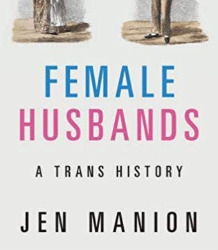
Long before people identified as transgender or lesbian, there were female husbands and the women who loved them. Female husbands - people assigned female who transed gender, lived as men, and married women - were true queer pioneers. Moving deftly from the colonial era to just before the First World War, Jen Manion uncovers the riveting and very personal stories of ordinary people who lived as men despite tremendous risk, danger, violence, and threat of punishment. Female Husbands weaves the story of their lives in relation to broader social, economic, and political developments in the United States and the United Kingdom while also exploring how attitudes towards female husbands shifted in relation to transformations in gender politics and women's rights, ultimately leading to the demise of the category of 'female husband' in the early twentieth century.
Mod opinion: I haven't read this one yet, but it sounds interesting.
#female husbands#jen manion#polls#trans lit#trans literature#trans books#lgbt lit#lgbt literature#lgbt books#nonfiction#history#transmasc#nonbinary#trans man#to read
90 notes
·
View notes
Text
Female Husbands: A Trans History by Jen Manion
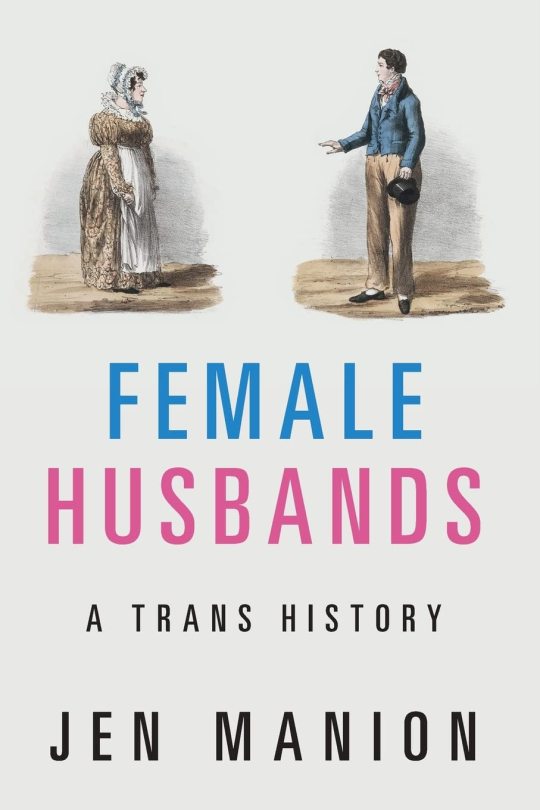
Long before people identified as transgender or lesbian, there were female husbands and the women who loved them. Female husbands - people assigned female who transed gender, lived as men, and married women - were true queer pioneers. Moving deftly from the colonial era to just before the First World War, Jen Manion uncovers the riveting and very personal stories of ordinary people who lived as men despite tremendous risk, danger, violence, and threat of punishment. Female Husbands weaves the story of their lives in relation to broader social, economic, and political developments in the United States and the United Kingdom while also exploring how attitudes towards female husbands shifted in relation to transformations in gender politics and women's rights, ultimately leading to the demise of the category of 'female husband' in the early twentieth century. Groundbreaking and influential, Female Husbands offers a dynamic, varied, and complex history of the LGBTQ past.
#female husbands: a trans history#female husbands#jen manion#transmasc#nonbinary#trans book of the day#trans books#queer books#bookblr#booklr
89 notes
·
View notes
Photo

Jen Manion
Gender: Non binary (they/them)
Sexuality: Queer
DOB: N/A
Ethnicity: White - American
Occupation: Historian, writer, professor, activist
67 notes
·
View notes
Text
35. Female Husbands: A Trans History, by Jen Manion
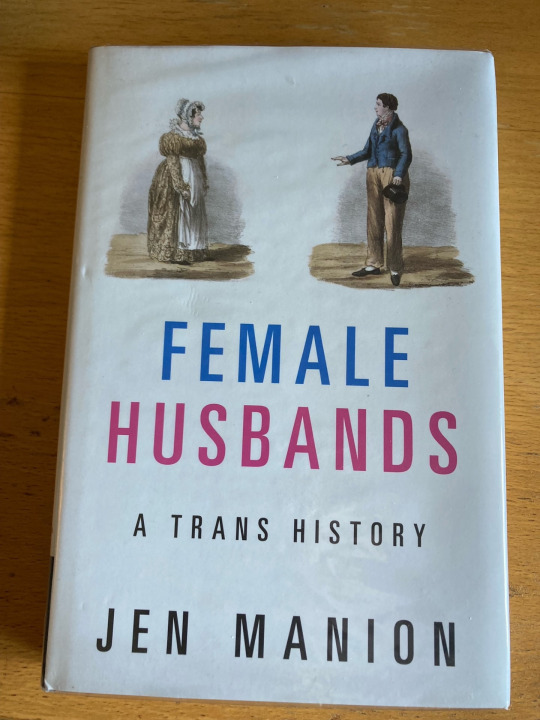
Owned: No, library
Page count: 278
My summary: It happens time and again. A man, living a perfectly normal life with his wife, is found to have a far different history than anyone assumed. But were these men truly women, or something else? This is a view back on the female husband with a modern lens, examining the phenomenon from a new angle.
My rating: 4/5
My commentary:
I am occasionally in the habit of sneaking down to the basement at work and checking out any books that look interesting from there. Am I meant to do that? Not technically. Don't tell the stock team guy. Anyway, this book immediately appealed to me. I'm interested in LGBT+ history broadly, and trans history specifically, which is such a weird subject sometimes. We can't always substantiate the idea that a historical person who was crossdressing or living as a different gender to the one they were assigned at birth would have identified as trans by necessity - particularly not people like the subjects of this book, designated female at birth and living as men. There were various social and economic benefits to passing as a man, after all, and someone who would otherwise have identified themselves as a woman might have passed as male in order to get better pay or better jobs. Nevertheless, there is a solid argument to be made for some cases that they were men, regardless of how the world viewed them, and that's what this book is here to explore - the trans history of the phenomenon of the 'female husband'.
Female husbands, as a group, were people who married women as men and were found to be designated female at birth. With our current cultural lens, we look back at many of them as possible trans men or lesbians - either would have a good reason for marrying women. For lesbians, obviously, they would have attraction to women but not be legally allowed to marry them as women. For trans men, being married to a woman was a factor that could masculinise them in the eyes of their community, helping them to pass. Of course, that's not to say that marriage for historical trans men was purely a defensive move to help them pass, but it was a benefit. There are certain trends in the cases of female husbands. The wives often claimed to not have known; though, after decades of marriage in some cases, I doubt that most sincerely. More likely, they were saving face in front of the community, attempting to escape scorn and ostracism by claiming innocence. The husbands were often living as men already when they met their wives, and had reasonably respectable jobs. Either they were found out posthumously, when doctors and morticians inspected their bodies, or they were outted, sometimes by their wives and sometimes by others in their communities. It's worth noting that every case in this book includes someone who was outted, which is how we know of their existence, but that's not to say that there couldn't have been female husbands who weren't outted and lived stealth their whole lives. Which was arguably true for those outted poshumously.
This book is interesting enough, though I did have some trouble with how it presents its information. The female husbands are referred to as 'they/them', which undercuts the point in some of their cases when it's noted that they continued to defend their masculine identity. The author is, by her own admission, a cis lesbian, and I got the impression that she wasn't all too familiar with transness by necessity - though that's not to say that anything in the book was bigoted, it just felt like it was written by a cis person from a generation above me. Which it was. She makes the choice to describe the female husbands as 'transing their gender', which I think is an accurate one for what she is describing - the people here made an active choice to, well, trans their genders, regardless of if they might have identified as trans if given the language and ability. Many of the cases were presented with similar language and hitting the same beats, which made it feel like I was reading the same information repeated. Overall, though, it was a good examination of the topic, and one I nonetheless enjoyed reading.
Next, it's time to end an era - the final House of Night book.
2 notes
·
View notes
Text
Everyone should be forced to read the same books I read. Mass book report. I want to talk to everyone about female husbands by Jen manion and I keep forgetting that people consume different media….
1 note
·
View note
Text
I'm reading Female Husbands: a Trans History right now and I'm obsessed with it, if any of you read the story of James Barry and wanted more (or wanted to know the real stories that inspired Monstrous Regiment) I can completely recommend it
There have been so many transmasc people through history, who lived as themselves and were loved by their spouses and their communities and whose tenacity and bravery is still so inspiring !! And the fact that this is inherently only a tiny fraction of those who lived as men since we only know the ones that were forced back into femininity by circumstance and who were interesting enough for the media to report on them - we exist and have always existed
#personal post#it's by Jen Manion btw#might post some stories from it when I've finished reading#also tempted to draw some interpretations of the people discussed#after how most of them were pilloried by the press and sometimes literally i think telling another side of their story is important
10 notes
·
View notes
Note
Hi! Just so you know it’s highly unlikely that photo you included in your book post on December 5th was Dr James Barry. According to Jeremy Dronfield and my own research, it’s of an Englishman called Joseph Barry who lived in the Cape around the same time as James. If you’re interested I’ve got a post discussing it linked in my pinned post. That aside, I hope you enjoyed/are enjoying the books you got! Female Husbands has been on my to read list for a while and I’d never heard of the Colonel so I’m interested to learn more about him
Oh, thanks for that! I think I saw other people citing that picture as Dr. Barry so I pulled from my memory to add to that post. I guess I'll add an amendment to the post since I can't unpost it?
Female Husbands was really good for information and to learn about hidden LGBT history but many of the stories were sad. I read it earlier this year and was very moved by the accounts in the book. Also Dr. James Barry is one of the people that Dr. Manion put in her study. He's briefly mentioned because he fell into her definition of female husband. The American Revolutionary War Hero Deborah Sampson too, notably, is also included. Their names were the only ones I recognized from somewhere else. The study includes female husbands from Ireland, The UK and The USA from the late 1700s until about WWI-ish. It was one of the best books I read this year honestly.
While I haven't read The Colonel's story yet- he's English, served in WWI and had a wife and a son. That's all I remember from the blurb. I hope to get to that book in 2023.
Good luck with your reading goals and research as well! :)
#dr. james barry#female husbands#colonel barker's monsterous regiment: a tale of female husbandry#books#bookblr#thanks for the ask!#female husbands: a trans history#dr. jen manion#rose collis
8 notes
·
View notes
Text
LESBIAN HISTORY BOOKS pls boost
Female Husbands : A Trans History - Jen Manion
Odd Girls and Twilight Lovers: A History of Lesbian Life in Twentieth Century America - Lillian Faderman
Boots of Leather, Slippers of Gold: The History of a Lesbian Community - Elizabeth Lapovsky Kennedey
Sappisteries: A Global History of Love Between Women: Leila J. Rupp
Not a Passing Phase: Reclaiming Lesbians in History 1840-1985 - Lesbian History Group
After Sappho- Shelby Wynn Schwartz
Public Faces, Secret Lives - Wendy L. Rouse
Lesbian Literature - Jodie Medd
It Came from the Closet - Joe Vallese
#academia#lgbtq community#lgbtq#lgbt memes#lgbt history#lgbt books#femme lesbian#lgbtedit#lesbian pride#butch lesbian#lesbian#lesbian history#lesbians#wlw#sapphic#wlw community#leather dyke#wlw love#wlw post#wlw blog#wlw books#wlw concepts#wlw positivity#wlw pride#wlw ship#wlw yearning#sapphic love#dykeposting#dyke#not reblog
128 notes
·
View notes
Note
how can you be a lesbian who’s attracted to/fucks all genders? genuine question no hate just doesn’t align with my understanding
hi!! thanks for asking I LOVE this subject and am so happy to talk about it!! This reply might get kind of long so I apologize in advance hehe <3
I assume you're sending this in response to the ask I got the other day asking about if bisexual women can say dyke, to which I said that I am bisexual & also a dyke (woman is debatable). That's the first place I want to start—that bisexuality does not necessarily equal attraction to all genders. It can! And I have no problem with someone who is attracted to all variations of all genders identifying with the lesbian label if that's what makes sense for them. But for me, I am attracted to women, and men, and people who fall outside of that binary—but I am not necessarily attracted to gendered expressions.
Personally, someone's gender identity really doesn't impact whether or not I might be attracted to them. I am specifically attracted to people who's gender expressions align with or reflect my own in some way—so as a butch, as someone who moves through the world as a lesbian, as someone who identified as trans masculine for several years, who has been on T and may go on T again—that is pretty expansive. For me, I am attracted to queer versions of masculinity—in all its shapes & variations. I don't think that experience precludes me from using the lesbian label! There is not one person that sees me move through the world that does not immediately clock me as a butch lesbian. I cannot change that (and nor do I want to). Does the fact that sometimes I fuck & fall in love with men mean that they're wrong? Or that I am for feeling comfortable with that label?
And that really isn't a new experience!! I am absolutely not alone in that kind of attraction model, and I am not the only person who gets clocked as a lesbian that is attracted to people who aren't women.
I can think of many significant figures & authors & activists in lesbian history who have really traversed what has been coined the "butch/FTM borderlands" by author C. Jacob Hale in 1998. Identity categories do not have hard borders—there's a liminal space that exists between them, and it's impossible to draw a distinct line between them. Hell—even the poet & lesbian icon Sappho wrote about both same-sex and different-sex relationships.
I think of communist, activist & author Leslie Feinberg & the exploration of being a leftist, working class butch in the 60's & 70s in Stone Butch Blues. That novel in particular, although fictionalized, is very much a reflection of their own life and details relationships with many different kinds of people while being very much rooted in lesbian culture.
I think of Jen Manion's article in Transgender Studies Quarterly titled "Transbutch," (article begins on page 213 of the linked pfd) where they write the following:
‘‘Transbutch’’ signifies a gendered embodiment that is both butch and trans, not tied to any singular definition of butch or trans but rather falling somewhere in between. Transbutch marks a liminal space that embraces both the historical legacies of the category of butch and the more expansive possibilities created by the transgender rights movement for recognition, community, and empowerment."
(italics my own) In other words, transbutch is about that sticky place between two identities. Someone can have ties to both of these identities at once—particularly since they have been so historically tied in terms of community.
And the argument being made by Manion I think really connects to the discussion here - being a lesbian is about more than who you sleep with. It's a political identity, it is a gender in of itself, it's about your community and how you connect to it.
Many of the lesbian icons that the community holds dear trouble the "woman loving woman" definition of the identity. And besides—it's not like lesbian is a finite resource. We have infinite space to welcome all kinds of people, anyone who wants to be in community together. There are so many ways to move through the world and so many ways to come to this identity.
Anyway! I don't know how to end this! I hope it was helpful <3
#asks#lesbian#bi lesbian#butch#other recommended reading that I couldn't fit into this discussion is butch is a noun by S Bear Bergman#or Female Masculinity by Jack Halberstam#^ these are more about the butch/transmasc borderland and not lesbian/bisexuality. but yknow. I think they still elucidate something about#this conversation
27 notes
·
View notes
Text
National Non-Fiction Day: 31 Titles to Get Your Queer Learn On!
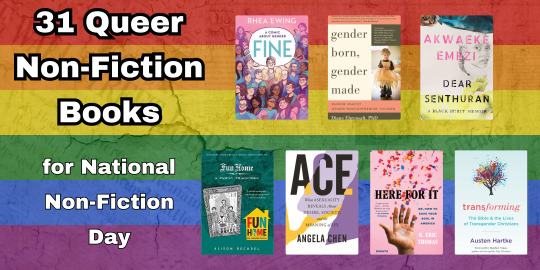
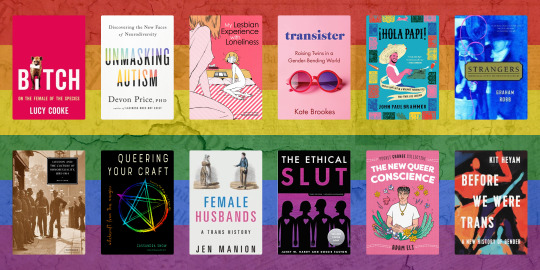
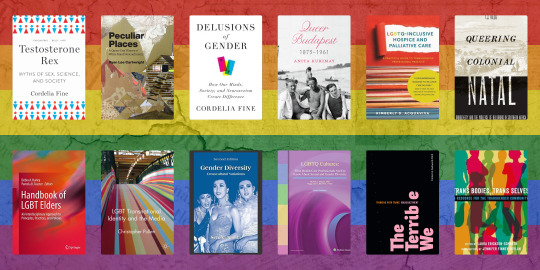
In the past year, we’ve posted a lot about our favorite queer fiction titles. We wanted to take Non-Fiction day to talk about the non-fiction titles that have impacted us! Whether self-help, memoirs, psychology, history, sociology, or a different non-fiction genre, these are books that have helped us learn, helped us teach, helped us improve, helped us see and be seen, and helped us be more informed. So join us as we introduce our thirty-one recommendations for National Non-Fiction Day!
Fine: A Comic About Gender by Rhea Ewing
Gender Born, Gender Made: Raising Healthy Gender-Nonconforming Children by Diane Ehrensaft
Dear Senthuran: A Black Spirit Memoir by Akwaeke Emezi
Fun Home: A Family Tragicomic by Alison Bechdel
Ace: What Asexuality Reveals about Desire, Society, and the Meaning of Sex by Angela Chen
Here For It: Or, How to Save Your Soul in America by R. Eric Thomas
Transforming: The Bible and the Lives of Transgender Christians by Austen Hartke
Bitch: On the Female of the Species by Lucy Cooke
Unmasking Autism: Discovering the New Faces of Neurodiversity by Devon Price
My Lesbian Experience with Loneliness by Nagata Kabi
transister: Raising Twins in a Gender-Bending World by Kate Brookes
!Hola Papi!: How to Come Out in a Walmart Parking Lot and Other Life Lessons by John Paul Brammer
Strangers: Homosexual Love in the Nineteenth Century by Graham Robb
London and the Culture of Homosexuality, 1885 – 1914 by Matt Cook
Queering Your Craft: Witchcraft from the Margins by Cassandra Snow
Female Husbands: A Trans History by Jen Manion
The Ethical Slut: A Guide to Infinite Sexual Possibilities by Janet W. W. Hardy and Dossie Easton
The New Queer Conscience by Adam Eli
Before We Were Trans: A New History of Gender by Kit Heyam
Testosterone Rex: Myths of Sex, Science, and Society by Cordelia Fine
Peculiar Places: A Queer Crip History of White Rural Nonconformity by Ryan Lee Cartwright
Delusions of Gender: How Our Minds, Society, and Neurosexism Create Difference by Cordelia Fine
Queer Budapest, 1873 – 1961 by Anita Kurimay
LGBTQ-Inclusive Hospice and Palliative Care by Kimberly D. Acquaviva
Queering Colonial Natal: Indigeneity and the Violence of Belonging in Southern Africa by T. J. Tallie
Handbook of LGBT Elders: An Interdisciplinary Approach to Principles, Practices, and Policies edited by Debra A. Harley and Pamela B. Teaster
LGBT Transnational Identity and the Media by Christopher Pullen
Gender Diversity: Crosscultural Variations by Serena Nanda
LGBTQ Cultures: What Healthcare Professionals Need to Know about Sexual and Gender Diversity by M. J. Eliason and P. L. Chinn
The Terrible We: Thinking with Trans Maladjustment by Cameron Awkward-Rich
Trans Bodies, Trans Selves: A Resource for the Transgender Community edited by Laura Erickson-Schroth
You can view this list as a shelf on Goodreads!
It can be so difficult to find good non-fiction resources on queer topics. Which titles to DO you recommend?
#duck prints press#book recs#queer non-fiction#national non-fiction day#book recommendations#rec list
55 notes
·
View notes
Text
Reading This Week 2024 #34
Hello! a professor I worked with last semester on his fantasy genre class asked for a recommendation for a queer book recommendation because apparently he admires my knowledge of contemporary fantasy publishing. I gave him a novella that seemed like it's fit the themes he was looking at (Silver in the Wood by Emily Tesh), and took the compliment instead of telling him that there are so many queer fantasy books my beloved tumblr mutuals are obsessed with but I haven't gotten to yet
Finished:
Invisible Kingdom, Vol. 1: Walking the Path and Vol. 2: Edge of Everything written by G. Willow WIlson, art by Christian Ward
this was pitched to me as cool scifi with lesbian leads, but to be perfectly honest i am not getting the chemistry between them at all..... the first volume was cool but the second felt like a major let down. I'm interested to see where the final volume goes tho so I'll still give it a shot
Bloom Into You, Vol. 2-3 by Nakatani Nio, translated by Jenny McKeon
on the other hand, the girls in lesbians in this manga are coming for my fucking throat. they are kind and caring but the Teenage Desire in this is strong and extremely messy (what is love? what does it mean to fall in love? what if you fall for each other at different speeds? is what you're doing with her right if you dont think you feel the same way?) reading it is like poking me in a bruise fucking WHAT
The Sprite and the Gardener by Rii Abrego and Joe Whitt
gorgeous art, bland story
Are You Listening? by Tillie Walden
inter-generational lesbian friendship roadtrip in rural texas. the way the world gets progressively stranger is very well done. this is a comparison i haven't seen made yet, but maybe check it out if you like Alice Isn't Dead?
long day by kathkin on ao3
Maigret Bides His Time by Georges Simenon, translated by Alastair Hamilton
just a short old mystery novel. fun time but in an outdated style
The Lies of Locke Lamora by Scott Lynch, narrated by Michael Page
Locke Lamora is... as you might say a Character Type that works for me very very often, to the point that I gender flipped it for a dnd character of mine. This was a great book with basically no misplaced or extraneous world building elements: it feels rich and lived in but everything snaps together perfectly. The book could maybe use more women, which maybe feels a bit greedy since there are a number of named interesting women characters, but none of them are leads and so those side characters just made me crave more. I just am also extremely OC-pilled and was kicking my feet imagining my girl Letha running around Camorr causing trouble.
Frieren: Beyond Journey's End, Vol. 1 written by Kanehito Yamada, art by Tsukara Abe, translated by Misa "Japanese Ammo"
fun and sweet, pretty straight forward in what it's doing so far
Female Husbands: A Trans History by Jen Manion, narrated by Kate Harper
a thorough history of many assigned-female-at-birth people in the UK and the US who passed as men, often legally marrying women for desire or for gender passing reasons (though not all of the people discussed in this book did so). leaves open both lesbian/same-sex desire and transmasculine interpretations, while also being as specific as possible to the lives, circumstances, and testimonies of its subjects (including the ways we know about them, and that very few of them after being discovered as "women" were allowed to continue in male dress)
Sensor by Junji Ito, translated by Jocelyne Allen
hm. well, interested to hear the Shelved by Genre opinion on this.
Started/Ongoing:
The River of Silver: Tales from the Daevabad Trilogy by S.A. Chakraborty, narrated by Soneela Nankani
finishing out the short vignette collection from this series
Witches, Princesses, and Women at Arms edited by Sacchi Green
a collection of semi erotic lesbian fairytales that I'm reading through. first one has an exiled princess cross dressing as a man and seducing a witch during her quest to slay a dragon
Homie by Danez Smith
poetry book i picked up because my black queer lit prof from last year talked about the second poem in here, which i think lives up to his interpretation of it
Reading Plans:
tbh, my brain is coughing up dust right now. finish the stuff in the prior section. get ready for actually writing my thesis in the coming months.
OH I'm going to read A Single Man by Christopher Isherwood for my queer lit book club, and I guess check out whatever Shelved by Genre is reading next? gotta take a look at my Libby loans, and pull something from my book shelf
3 notes
·
View notes
Note
Have you read Jen Manion's Female Husbands: A Trans History?
And if so, would you recommend it as an academically rigorous text, or is it more pop-sci?
I haven't read it but it's on my mental list of books I should probably check out at some point.
4 notes
·
View notes
Text
The First Self-Proclaimed Drag Queen Was a Formerly Enslaved Man
In the late 19th century, William Dorsey Swann’s private balls attracted unwelcome attention from authorities and the press

In the late 1880s, a formerly enslaved man named William Dorsey Swann started hosting private balls known as drags, a name possibly derived from “grand rag,” an antiquated term for masquerade balls. Held in secret in Washington, D.C., these parties soon caught authorities’ attention.
As the Washington Criticreported in January 1887, police officers who raided one such gathering were surprised to encounter six Black men “dressed in elegant female attire,” including “corsets, bustles, long hose and slippers.” The following April, the Evening Starreported on a raid that targeted men in “female attire of many colors,” as well as “gaudy costumes of silk and satin.” On both occasions, authorities arrested the party guests and charged them with “being suspicious characters.”
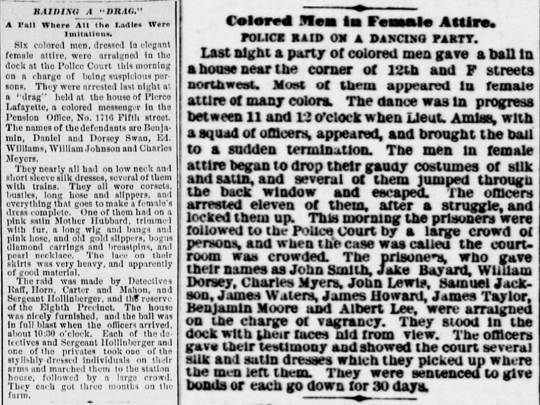
Joseph’s chance find marked the beginning of a yearslong quest to uncover Swann’s story—and, with it, the history of drag in the United States. He chronicles the results of this research in an upcoming book titled House of Swann: Where Slaves Became Queens—and Changed the World. Drawing on extensive archival research, Joseph presents a compelling portrait of the nation’s first self-proclaimed drag queen. The historian proudly positions Swann as the “first queer American hero.”
The identification of Swann as the first reported drag queen in the U.S. is a “major event,” says Jen Manion, a historian at Amherst College. “LGTBQ history is hampered by the lack of diaries and personal letters and family papers, because you just don’t put [those feelings] in writing.” For much of recorded history, Manion adds, being gay or bisexual was considered “a sin; it’s illegal.”
Joseph says his research resurfaces the “experiences of queer people, … historical experiences, not fictionalized experiences, documenting them rather than speculating.” These findings, in turn, helped him pinpoint the birth of “the drag queen.”
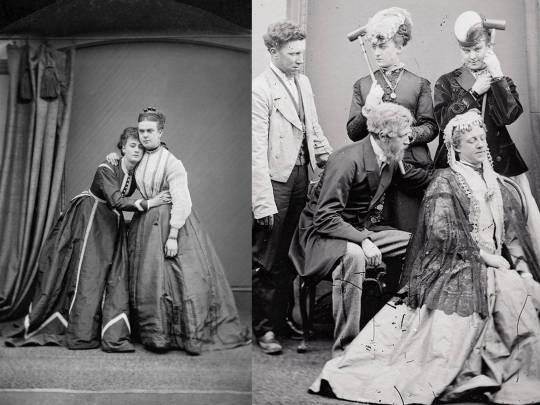
The concept of drag “existed for some period of time unknown,” says Joseph. But the term only came into use in 19th-century Great Britain, where Joseph says it referred to “a gathering of people, particularly men, who were dressing as women.” In 1871, two members of the British aristocracy were put on trial after they were caught dressing as women in public. Authorities charged Ernest “Stella” Boulton and Frederick “Fanny” Park with “conspiring and inciting persons to commit an unnatural offense.” A jury found the defendants not guilty but handed down a minor indictment to the men for wearing women’s clothing.
Cross-dressing, which is often a component of drag, has a lengthy history on both the stage and the screen, from Elizabethan-era performances in which men played women to Japanese Kabuki theater. In the early 20th century, performers like Julian Eltinge became stars by impersonating women during the vaudeville craze. In the 1950s, Milton Berle dressed as a woman on his variety TV show, as did comedian Flip Wilson in the early 1970s. In the early 1980s, the sitcom “Bosom Buddies” starred Tom Hanks and Peter Scolari as two young men who disguise themselves as women so they can live in an inexpensive, women-only apartment building.

Historian Kathleen Casey, author of The Prettiest Girl on Stage Is a Man: Race and Gender Benders in American Vaudeville, takes a much wider view of drag. While she includes all manner of cross-dressing performances in her definition, she doesn’t think there will ever be “a stable meaning of the term ‘drag.’” Casey adds, “Drag is about race, class and sexuality as much as it is about gender. If we focus exclusively on only one of these intersections, we fail to see how drag performances are layered across time and space and can have multiple meanings for different audiences.” Drag, she says, is really about a performer’s own perspective of their work, as well as audiences’ understanding of this work.
Many of the “contemporary categories and terms that we use in modern life to describe LGBTQ people or sexual and gender minorities” date to the late 19th century, says Manion. “Lesbian,” for instance, was first used in a medical journal in 1883. The historian adds, “We debate amongst ourselves as scholars when it seems appropriate to use contemporary terms to describe things [in] the past, but in this case, these were terms used by … the people at the time as well.”

Swann was born into slavery in Washington County, Maryland, around 1858. According to a 2021 entry by Joseph in the African American National Biography, Swann was the fifth of 13 children born to enslaved housekeeper Mary Jane Younker and enslaved wheat farmer and musician Andrew Jackson “Jack” Swann. (His biological father may have been a white man, but Joseph hasn’t found definitive evidence confirming this theory.) After the Civil War ended in 1865, Swann’s parents bought a plot of land and started a farm. Encouraged to work as soon as he was old enough, the young Swann found employment as a hotel waiter. In 1880, he relocated to Washington, where he worked as a janitor and sent money back home to his family.
Like Washington more broadly, the capital’s underground queer networks were divided into white and Black communities that rarely intersected. As a 2019 report prepared for the city’s Historic Preservation Office notes, “It was a hushed fact that Lafayette Square in D.C., which is adjacent to the White House, was a known cruising spot for gay men, both Black and white,” but the majority of these individuals were only interested in liaisons with partners of the same race. An exception to this trend was Washington’s drag scene, which often attracted mixed-race audiences.
Forging a place for himself in the city’s queer Black community, Swann held parties that Joseph deems the first documented “drag balls” in American history. Held in secret, they provided a safe space for gender expression but were risky to attend. “A large but undetermined number managed to flee during the police raids, but the names of those arrested and jailed were printed in the papers, where the men became targets of public scorn,” wrote Joseph for the Nation in 2020. “In post-Civil War America, there was very little patience for men who subverted gender norms.” Sentences for those charged with attending drag balls ranged from around three to ten months.
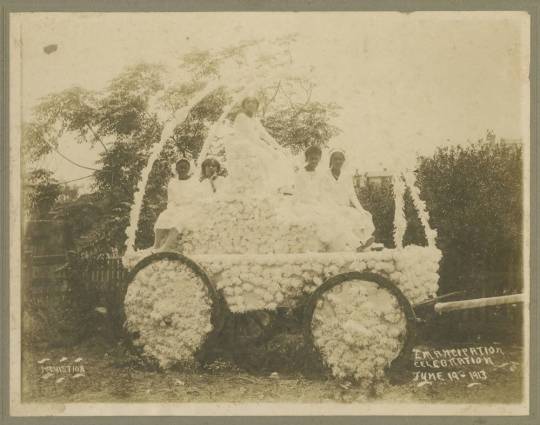
Around this same time, Swann became enthralled by the “queens of freedom” crowned at Washington’s Emancipation Day parades—annual celebrations first held in April 1866. Historically, each neighborhood was represented by a woman who “personified freedom for Black people,” according to Joseph. Inspired by these queens, Swann started crowning the winners of his dance competitions the “queen of the ball,” says Joseph.
Swann also adopted the title for himself. As the Washington Critic noted on April 13, 1888, “William Dorsey, who, by the way, was the ‘queen,’” was one of 13 people arrested during a raid on a “drag party” the previous night.
“There’s this concept of drag, which is separate, and there’s the concept of queens of freedom, and in D.C. in this particular time, post-slavery, post-Reconstruction, these two concepts collide,” says Joseph. “To identify as a drag queen, which is what William Dorsey Swann did, is combining these two strains, these two cultural traditions.”
The 1880s saw a “wave of laws passed in cities all across the country explicitly banning cross-dressing,” says Manion, who adds that the rules were “applied very selectively” and were riddled with inconsistencies and contradictions. The arrests of Swann and his friends were “even more sensationalized in the press and probably drew the attention of authorities because most of the participants were Black,” Manion explains. “And this is in Jim Crow America. For queer … Black Americans to just see so much joy and freedom in their gender expression at this time was definitely seen as a threat.”

The court sentenced Swann to 300 days in prison. After serving three months of his sentence, Swann, who had pled not guilty, filed a petition for a pardon from President Grover Cleveland, says Netisha Currie, an archives specialist at the National Archives, which houses a copy of the petition. In a show of support, 30 of Swann’s friends signed the document. But U.S. Attorney A.A. Birney argued vehemently against the pardon, stating,“The prisoner was in fact convicted of the most horrible and disgusting offenses known to the law; an offense so disgusting that it is unnamed. … His evil example in the community must have been most corrupting.”
Ultimately, Cleveland denied the petition. Still, wrote Joseph for the Nation, Swann’s unsuccessful attempt to clear his name represents the earliest documented example of an American activist taking “specific legal and political steps to defend the queer community’s right to gather without the threat of criminalization, suppression or police violence.”
As Manion says, “What’s unique about [Joseph’s] work is that it captures a collective community. When we have been able to identify queer and trans figures in this era and earlier, we find them in isolation. And we can seldom connect the dots to say, ‘Oh, these two couples were friends. They always hung out.’ … We have very little evidence of collective socializing.”
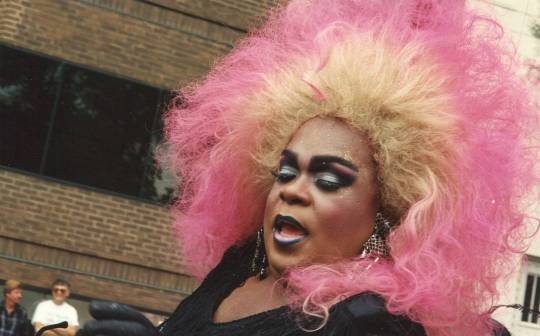
No known pictures of Swann survive. But his contributions to queer activism in Washington will soon be recognized with the redesignation of a stretch of Swann Street Northwest in his honor. The street was originally named for Thomas Swann, a former Maryland governor and Baltimore mayor who bore no relation to the drag queen.
“We have seen so much anti-trans and anti-drag legislation and rhetoric around the country in a very problematic way,” says Brooke Pinto, a D.C. Council member who introduced the bill. “In Washington, D.C., where we are proud to have so many trans residents, we [need to] speak up and recognize, sometimes through symbolism, sometimes through legislation, how important these issues are.”
The bill also calls for a historic plaque to be posted in Dupont Circle, a Washington neighborhood with a rich LGBTQ history. The plaque will sit at the corner of New Hampshire Avenue, Swann Street Northwest and 17th Street Northwest.
“One of the things that’s so exciting about this case is that it is an African American man who was formerly enslaved,” says Manion. Such individuals “just don’t get … recognition in our histories of LGBTQ people, in part because we usually can’t find them in the archives. But … Swann was hiding in plain sight.”
#swann#Drag Balls#Origins of Drag Balls#DC#LGBTQ+#The First Self-Proclaimed Drag Queen Was a Formerly Enslaved Man#William Dorsey Swann#Drag Queens#origins of drag ball culture in DC
12 notes
·
View notes
Text

Daily Pride Month book recs:
Female Husbands by Jen Manion
Discusses trans masc & lesbian history
Nonfiction
Female Husbands is about the historic phenomenon of afab people assuming masculine clothing and marrying women. It encompasses a history of both lesbians and trans men, and shows how interconnected our communities have always been. The book talks about specific cases that have been documented throughout the UK and America, and is by a queer author meaning there is a lot more nuance and understanding in uncovering these cases.
10 notes
·
View notes
Note
throwing Female Husbands: A Trans History by Jen Manion into the ring here (haven’t read it quite yet but it’s on my TBR list)
Thank you for the submission, I added it to the list :)
2 notes
·
View notes